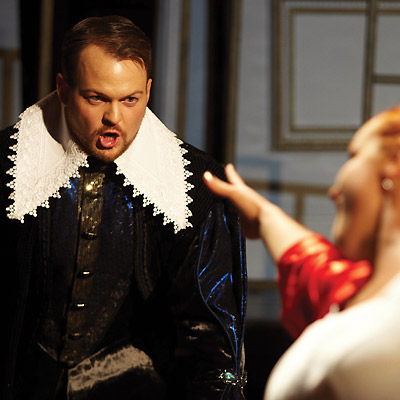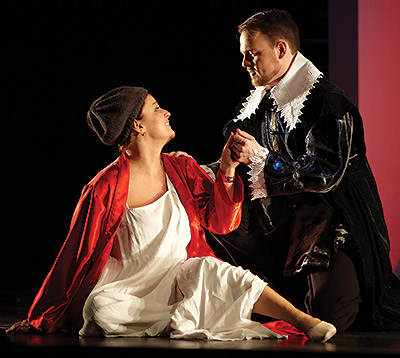Chad Armstrong: First came the voice, then came opera

Chad Armstrong is kind of like superman. A few know him as an efficient executive assistant working in New York City. More are coming to recognize him as Mozart's Figaro, Offenbach's Hermann, and Puccini's Marcello. Armstrong is a man of many characters and one rich baritone voice. A voice discovered at Minot State University.
The young Canadian from Estevan enrolled at MSU in 1992 as a music education major. Although he had played the lead in "The Music Man" — the only high school musical he ever auditioned for — he didn't think of himself as a singer. He was a trombonist inspired to follow in the footsteps of beloved Estevan music instructor Colin Grunert.
"I had Mr. G in the fifth grade all the way through high school. He did amazing things with the music program," Armstrong said.
As a member of Grunert's jazz and wind ensembles, Armstrong played trombone in music festivals in Canada and the United States, including MSU's annual jazz festival, which introduced him to the campus.
Like many college freshmen, Armstrong wasn't entirely certain of his career path. In fact, he spent his second year as a pre-med student at the University of Saskatchewan. It turned out music and MSU were the right fit after all, so he returned to Minot.
Among Armstrong's required music education course was choir, for which he had to audition. When he appeared before choral director Kenneth Bowles, Armstrong said, "I didn't even have a song to sing, so I just sang ‘God Save the Queen' because I knew it."
Pleased with what he heard, Bowles placed Armstrong in the baritone section and recruited him for MSU's Madrigal Singers. Six or seven private voice lessons later, the professor told the trombonist: "You have the type of voice that universities would pay you to get a master's degree." In that moment, Armstrong says, a thoroughly unplanned career choice began to take shape.
He continued to study voice and spent the summer before his senior year with Cape Cod's College Light Opera Company, performing musicals and Gilbert and Sullivan operettas. "It was an amazing summer. I loved every part of it," Armstrong said, adding that he especially enjoyed the camaraderie.

"When I was in high school, I was a jock," Armstrong said. "I played every sport under the sun — hockey, volleyball, track. Being on stage has the same sort of team mentality. It's the idea of a group of you working together toward one goal. It's not a lonely profession. I couldn't do anything else that makes me feel more fulfilled."
And yet, as he prepared to audition for graduate school, he remembers thinking, "I can't believe I'm choosing opera as a career when I haven't even seen one before." He witnessed his first live performance — "Madame Butterfly" — in Dallas in 1999, the same year he began graduate studies at Bowles' alma mater, the University of Oklahoma.
Minot's Western Plains Opera Company provided Armstrong with his first paid professional performance. He sang the role of Morales in "Carmen" when he was a student at Oklahoma. He'd nearly completed his doctorate when Armstrong quit school and gave himself over entirely to the stage. He's performed with opera companies in Oklahoma, Utah and New Jersey. He's sung with the National Lyric Opera, Opera Worcester, Opera in the Hamptons and Operafest di Roma in Rome. As a concert performer and recitalist, he's appeared at Lincoln Center and several times at Carnegie Hall.
This fall, as a winner in Hungary's 2009 Mezzo TV Festival and Competition, Armstrong made his debut with the National Moravian-Silesian Theatre in Ostrava, Czech Republic. As part of the final round of competition, his performance as John Donne in Marco Tutino's "Vita" was broadcast to more than 40 countries.
Last year in New York, Armstrong played the title role in the premiere of Tobias Picker's "Fantastic Mr. Fox." An artist-in-residence with New York's Dicapo Opera Theatre in 2008, Armstrong will sing the role of Tom Carter in the company's 2010 New York premiere of "Hotel Casablanca."
With each performance, Armstrong expands his repertoire and captures the attention of critics as "a standout … with one of the finest voices in the cast."
His goal is to sing full time. He's seeking an agent to represent him in the United States. In Europe, singers can have many agents working to find them roles, and he hopes to attract several. He's ready to live wherever his voice takes him, a voice destined to get better with age.
"I'm in my mid-30s, but I'm a Verdi baritone, and as Verdi baritones go, my voice is still young," he said.
As for the future, Armstrong is aching to sing one of the great baritone leading roles, Verdi's Rigoletto.
"It's going to be a great moment when I get to do it," he said.
And one day he hopes his voice will lead him to New York's Metropolitan Opera House.
"You don't have an international career if you haven't been singing at the Met, but when you get into the biggest opera arena in the world, you hope to get there when you're ready for it," he said. Chad Armstrong plans to be ready.
— Story by Cathy Jelsing with photos by Gábor Dusa





